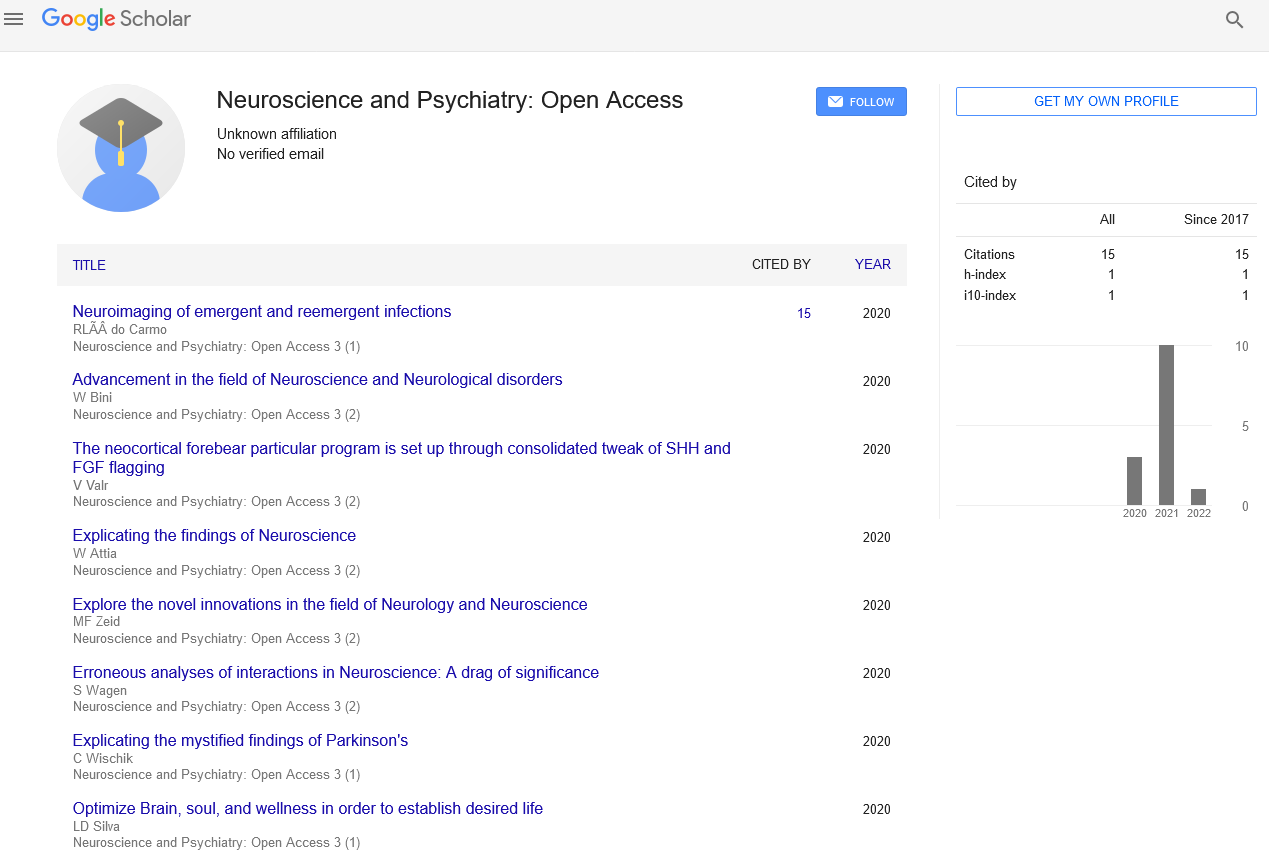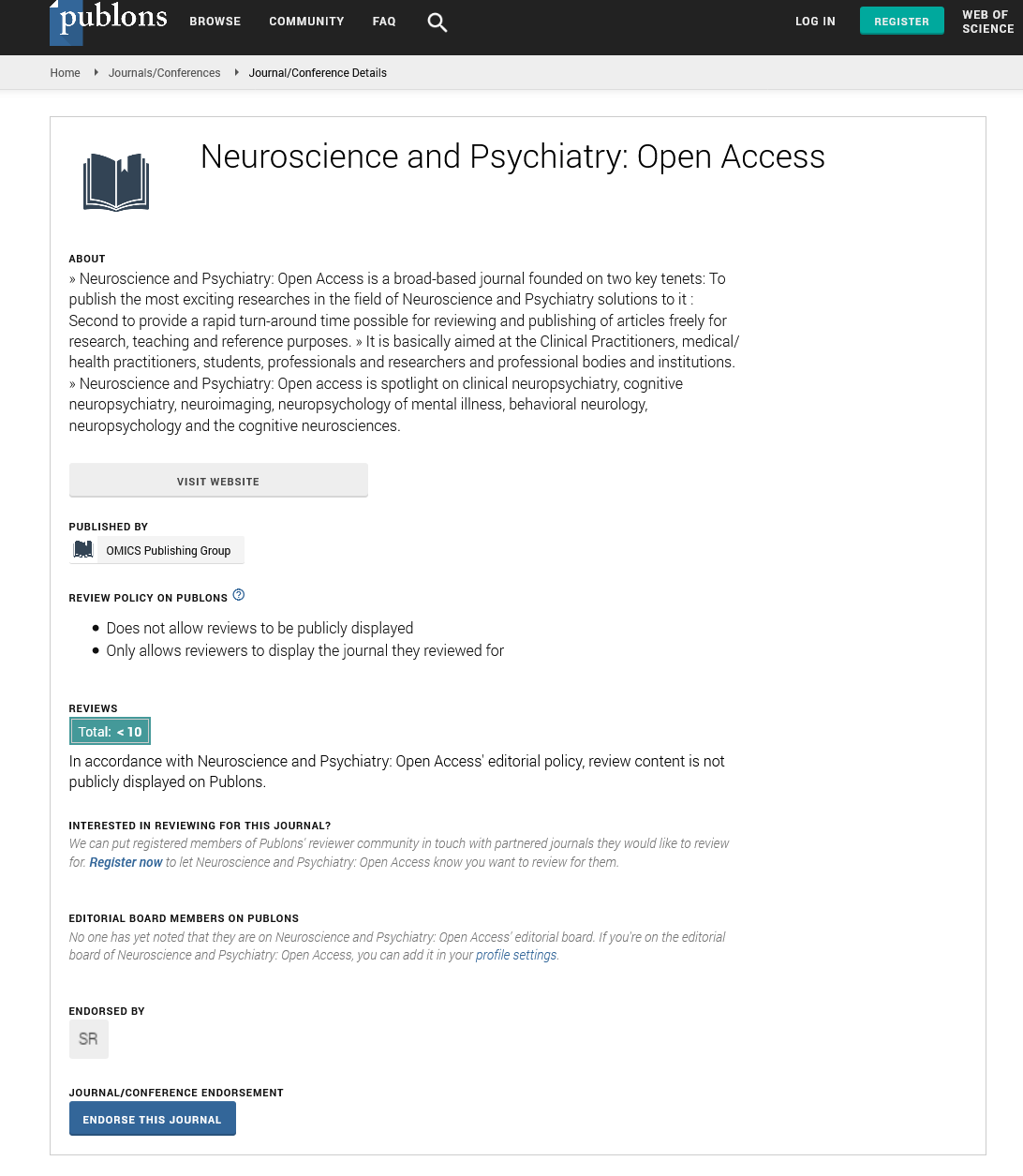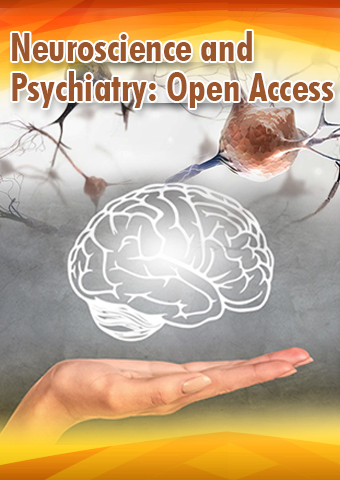Editorial - Neuroscience and Psychiatry: Open Access (2023) Volume 6, Issue 1
Psychiatry Residents' Perceptions of Neuroscience and Its Application to Psychiatric Practice at Canadian Universities
Francis Abernathy*
Department of Neuroscience and Psychiatric Somalia
Department of Neuroscience and Psychiatric Somalia
E-mail: Abernathy_f5@gmail.com
Received: 28-Jan-2023, Manuscript No. npoa-23-87719; Editor assigned: 31-Jan-2023, Pre-QC No. npoa-23- 87719 (PQ); Reviewed: 14- Feb-2023, QC No. npoa-23-87719; Revised: 16- Feb-2023, Manuscript No. npoa-23- 87719 (R); Published: 23-Feb-2023, DOI: 10.37532/npoa.2023.6(1).01-03
Abstract
The training of psychiatrists in neuroscience is lacking, despite recent advances in neuroscience highlighting its potential applications in the assessment and treatment of psychiatric disorders. However, it is unclear to what extent trainees in Canada are interested in acquiring additional knowledge and incorporating neuroscience into their everyday clinical practice. This study asked Canadian psychiatry trainees to assess their own understanding of neuroscience and the perceived relevance of neuroscience knowledge to effective psychiatric practice to see how they felt about neuroscience education and training. Canadian universities' psychiatry residents received an online survey. Self-evaluations of neuroscience knowledge, attitudes toward neuroscience education, preferences for learning methods, and interest in particular neuroscience topics were all included in this questionnaire.
Keywords
Psychiatry training • Psychiatry resident attitudes • Neuroscience • Graduate medical education
Introduction
The genetics to in vitro cellular recording to animal models to functional brain mapping, this field's investigations employ a wide range of methods and specializations. Numerous psychiatric disorders' biological bases have been better understood and novel therapeutic strategies have been developed thanks to revolutionary new neuroscience methods and approaches over the past few decades [1]. Immunohistochemical and electrophysiological methods, for instance, have contributed to the understanding of the underlying mechanisms of anti-NMDA receptor encephalitis, an autoimmune condition with prominent psychiatric symptoms; Epigenetic studies have increased our understanding of the complex interaction of genetic, environmental, and experiential factors that influence the development of addictive behavior [2]. Functional imaging and network connectivity analyses continue to improve our understanding of the dysfunctional neural circuitry underlying major depressive disorder, guiding the growing use of non-invasive brain stimulation interventions. The ethology and treatment of psychiatric disorders can now be discussed in new ways thanks to advances in neuroscience, which provide a new framework for explaining these conditions. However, there have been warnings about the growing integration of neuroscience into psychiatry [3]. For instance, there is on-going debate regarding the degree to which patients benefit from placing psychiatric disorders and the maladaptive behavior that are associated with them in the context of brain disease. In addition, there are numerous disagreements regarding whether these neurobiological discoveries are sufficiently characterized to have a practical impact on patient care, despite the significant advancements in neuroscience research over the past few decades [4]. Despite these cautions, neuroscience research is on the rise, and the field of psychiatry will only continue to be flooded with neuroscience information over time. Psychiatrists need the tools to effectively navigate this euro-psychiatric landscape if they are to be able to evaluate and synthesize emerging neuroscience findings and determine whether new information can be incorporated into their practice [5]. There is still a significant gap between the knowledge of neuroscience and the day-to-day practice of psychiatrists, despite the rapid expansion of neuroscience research and the ever-increasing overlap between neurology, neuroscience, and psychiatry [6]. There may be a number of reasons for this gap: a perception that there is little clinical relevance to neuroscience knowledge in patient care, low motivation or a negative attitude toward learning neuroscience, or a lack of exposure to neuroscience education during residency training [7].
Methods
Survey
As a supplementary, the complete questionnaire is provided. With the exception of one question assessing interest in taking a course in the neuroscience of psychiatry, this study replicated all of the questions that were asked of American trainees in a paper by Fung and colleagues with a few minor modifications to the wording. The survey was designed by Fung and colleagues with categorical response items to capture three main themes in addition to basic demographic data [8]. The Survey Monkey website was utilized for the creation and hosting of an online survey. All psychiatry residents received an invitation email from the program administrator of the psychiatry department at each English-speaking Canadian university, which included a link to the online survey. For a total of ninety days, the survey was open. Two reminder emails were sent to potential participants 30 days after the initial invitation to increase response rates [9]. Each university had between one and sixty residents, with an estimated total of 500 psychiatry residents. We anticipated a 20 percent response rate for approximately 100 respondents based on previous studies of surveys of a similar nature.
Specific Neuroscience Subjects and Neuroscience Domains
The neuroscience that will be taught with animal models playing the smallest role. "Cellular and molecular biology" was valued more highly by junior trainees than by seniors. Male and female respondents' perspectives were identical. The trainees showed the most interest in learning about "attention cognition, neuroplasticity, and psychotherapy" in terms of specific neuroscience topics [10]. The terms "epigenetics," "basic research-driven drug development," and "developmental neurobiology" received the least attention. When compared to men, females demonstrated a greater interest in learning about the following subjects: attention and cognition, developmental neurobiology and epigenetics, and the "neurobiology of attachment." When compared to senior trainees, junior trainees expressed a greater interest in developmental neurobiology.
Discussion
Senior residents do not report having a higher level of knowledge about neuroscience than junior residents, indicating that psychiatry residency programs are failing to improve residents' neuroscience competency as they progress through their training. Junior and senior residents also do not report having a higher level of knowledge about neuroscience than junior residents. Despite this, the majority of residents have a very favourable opinion of neuroscience and the potential benefits of neuroscience education in psychiatry. They agree that more neuroscience education would help delineate personalized treatments, discover future treatments, stigmatize patients with psychiatric illness, and comprehend mental illness. As a result, psychiatry trainees and program directors in other nations share the perception that Canadian trainees recognize a void in their neuroscience training and believe that neuroscience education is beneficial to patient care. The National Neuroscience Curriculum is one of several programs being developed to enhance neuroscience education for psychiatry trainees and psychiatrists. Other authors have proposed methods for enhancing neuroscience education in psychiatry residency training. The majority of programs still do not teach neuroscience in a systematic and comprehensive manner, despite the fact that the majority of residency directors recognize the significance of incorporating neuroscience into psychiatry training. Benjamin and colleagues suggest a number of possible explanations for this discrepancy, including the fact that accreditation agencies do not require neuroscience training, a dearth of experienced neuroscience teachers, and the complexity of neuroscience research, which makes it more intimidating and separates it from practical clinical skills.
Conclusions
This study shows that a lot of Canadian psychiatry residents think that the education they get from their residency programs about neuroscience isn't good enough, that they don't know enough about neuroscience, and that they would like to learn more about neuroscience. Psychiatry residencies ought to have as their primary objective the training of future psychiatrists who are capable of incorporating pertinent neuroscientific findings into their practice and who have an interest in it. Neuroscience complements psychotherapy, clinical knowledge, and treatment rather than competing with it. Medical neuroscience isn't just for neurologists and neurosurgeons anymore; it's also an important tool for psychiatry professionals.
References
- Kayser MS, Dalmau J. Anti-NMDA receptor encephalitis autoimmunity and psychosis. Schizophr Res. 176, 36–40 (2007).
- Downar J, Daskalakis ZJ. New targets for rTMS in depression: a review of convergent evidence. Brain Stimul. 6, 231–240 (2013).
- Mulders PC, Eijndhoven PF, Schene AH et al. Resting-state functional connectivity in major depressive disorder a review. Neurosci Biobehav Rev. 56, 330–344 (2015).
- Nielsen DA, Utrankar A, Reyes JA et al. Epigenetics of drug abuse predisposition or response. Pharmacogenomics. 13, 1149–1160 (2012).
- Ajonijebu DC, Abboussi O, Russell VA et al. Epigenetics a link between addiction and social environment. Cell Mol Life Sci. 74, 2735–2747 (2017).
- Pescosolido BA, Martin JK, Long JS et al. A disease like any other A decade of change in public reactions to schizophrenia, depression, and alcohol dependence. Am J Psychiatry. 167, 1321–1330 (2010).
- Malla A, Joober R, Garcia A. Mental illness is like any other medical illness a critical examination of the statement and its impact on patient care and society. J Psychiatry Neurosci. 40, 147–150 (2015).
- Ross DA, Travis MJ, Arbuckle MR. The future of psychiatry as clinical neuroscience why not now. JAMA Psychiatry. 72, 413–414.
- Traicu A, Joober R. The value of a skeptical approach to neurosciences in psychiatric training and practice. J Psychiatry Neurosci. 42, 363–365 (2017).
- Tandon R, Rankupalli B, Suryadevara U et al. Psychiatry is a clinical neuroscience, but how do we move the field. Asian J Psychiatr. 17, 135–137 (2015).
Indexed at, Google Scholar, Crossref
Indexed at, Google Scholar, Crossref
Indexed at, Google Scholar, Crossref
Indexed at, Google Scholar, Crossref
Indexed at, Google Scholar, Crossref
Indexed at, Google Scholar, Crossref
Indexed at, Google Scholar, Crossref
Indexed at, Google Scholar, Cross ref
Indexed at, Google Scholar, Crossref


